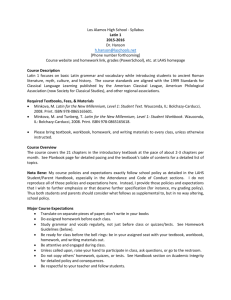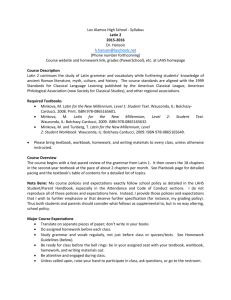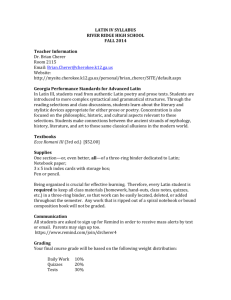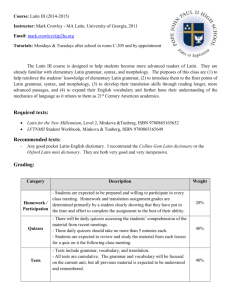Latin 3 Syllabus - Los Alamos Public Schools
advertisement
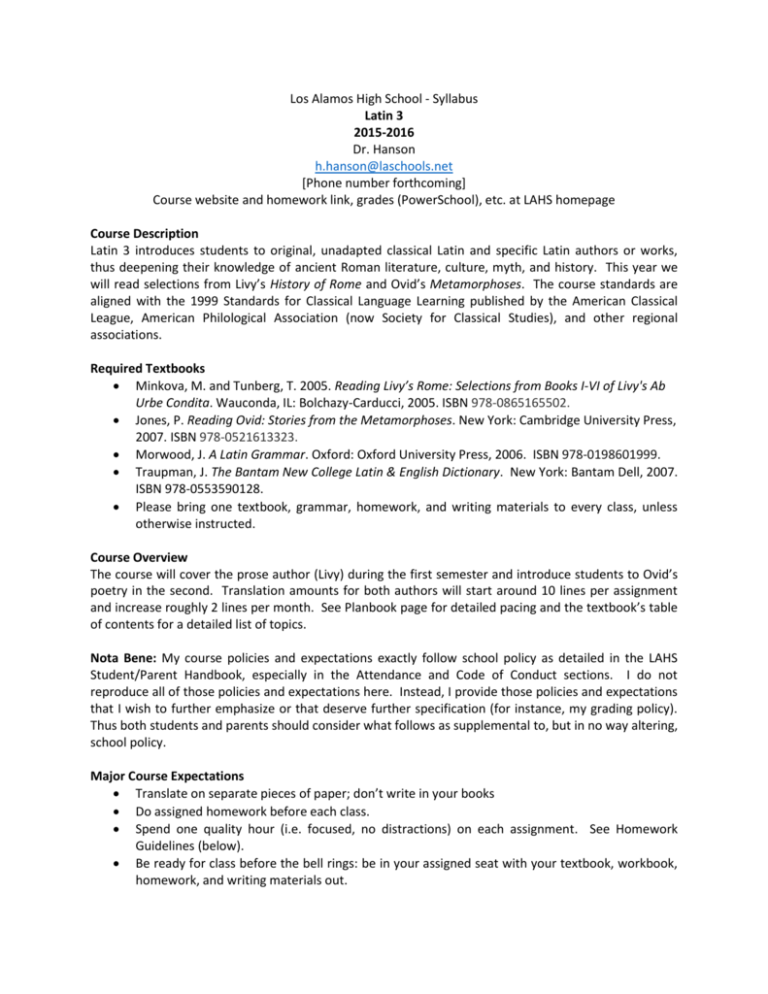
Los Alamos High School - Syllabus Latin 3 2015-2016 Dr. Hanson h.hanson@laschools.net [Phone number forthcoming] Course website and homework link, grades (PowerSchool), etc. at LAHS homepage Course Description Latin 3 introduces students to original, unadapted classical Latin and specific Latin authors or works, thus deepening their knowledge of ancient Roman literature, culture, myth, and history. This year we will read selections from Livy’s History of Rome and Ovid’s Metamorphoses. The course standards are aligned with the 1999 Standards for Classical Language Learning published by the American Classical League, American Philological Association (now Society for Classical Studies), and other regional associations. Required Textbooks Minkova, M. and Tunberg, T. 2005. Reading Livy’s Rome: Selections from Books I-VI of Livy's Ab Urbe Condita. Wauconda, IL: Bolchazy-Carducci, 2005. ISBN 978-0865165502. Jones, P. Reading Ovid: Stories from the Metamorphoses. New York: Cambridge University Press, 2007. ISBN 978-0521613323. Morwood, J. A Latin Grammar. Oxford: Oxford University Press, 2006. ISBN 978-0198601999. Traupman, J. The Bantam New College Latin & English Dictionary. New York: Bantam Dell, 2007. ISBN 978-0553590128. Please bring one textbook, grammar, homework, and writing materials to every class, unless otherwise instructed. Course Overview The course will cover the prose author (Livy) during the first semester and introduce students to Ovid’s poetry in the second. Translation amounts for both authors will start around 10 lines per assignment and increase roughly 2 lines per month. See Planbook page for detailed pacing and the textbook’s table of contents for a detailed list of topics. Nota Bene: My course policies and expectations exactly follow school policy as detailed in the LAHS Student/Parent Handbook, especially in the Attendance and Code of Conduct sections. I do not reproduce all of those policies and expectations here. Instead, I provide those policies and expectations that I wish to further emphasize or that deserve further specification (for instance, my grading policy). Thus both students and parents should consider what follows as supplemental to, but in no way altering, school policy. Major Course Expectations Translate on separate pieces of paper; don’t write in your books Do assigned homework before each class. Spend one quality hour (i.e. focused, no distractions) on each assignment. See Homework Guidelines (below). Be ready for class before the bell rings: be in your assigned seat with your textbook, workbook, homework, and writing materials out. Be attentive and engaged during class. Unless called upon, raise your hand to participate in class, ask questions, or go to the restroom. Do not copy others’ homework, quizzes, or tests. See Handbook section on Academic Integrity for detailed policy and consequences. Be respectful to your teacher and fellow students. Listen to and follow the instructions of your teacher. Turn off all electronic devices, especially cell phones, during class. See Handbook for detailed policy and consequences. No food or drink in class. Ask for permission if you would like to have a water bottle. Homework, Class Work, Participation See assignment sheet or Planbook page for homework assignments. Note that you need to complete homework assignments before class starts. ***I will randomly collect and grade homework or class work, without any announcement.*** When applicable, I may grade a class activity that requires your participation, again without any announcement. I will do this approximately 5-10 times per month. Homework Guidelines: Latin 3 For any given homework assignment, spend no more than 1 quality hour (i.e. focused, no distractions). Although I assign certain amounts, I will be focused on the quality of your translations and your understanding of the grammar; you should focus on those things too. Time needed to study for tests and quizzes will depend on the quality of your previous work and your attentiveness during class. If I require you or you need to memorize grammar and vocab, try to do so every day for 15min. Reduce your homework assignment time to 45min. Again, you should spend no more than 1 quality hour for any given homework assignment. The Latin 3 textbooks are designed to help you transition from adapted, simplified Latin to the unadapted original. This is a difficult transition, so be patient. When translating, use a separate piece of paper; do not write in the books. Write out a very literal translation, not a paraphrase; your English grammar and sentences should exactly parallel the Latin. The resulting translation will be stilted, but nevertheless readable, grammatical, comprehensible, etc. You are encouraged to make additional notes about the Latin, but do not write in the books. If you cannot translate a sentence, make notes about the grammatical forms and English definitions of every word. Use the notes at the bottom of the page, to help with both translation and vocabulary. If the notes don't help, you probably want to look the word up in your dictionary; you can use the back of the textbook, but it might not include every word. Another option is to find the passage at nodictionaries.com or perseus.tufts.edu; here you can find definitions by simply clicking on words, although the definitions are sometimes incorrect or incomplete. Grading At the introductory level (Latin 1 and 2), quizzes and tests typically focus on grammar, translation/understanding, and vocabulary equally. At the intermediate level (Latin 3 and higher), translation/understanding typically becomes the priority. Semester grades will be determined according to the chart below. Note that the numbers of items are projected and subject to change. However, their relative values are fixed. Projected Number Percentage of Overall Grade (fixed) 5-10/mo 20% Quizzes ~3-5 35% Tests ~1-3 35% Final 1 10% Homework, Classwork, Participation Quarter grades are weighted similarly, but do not include a final exam. I will assign zeros for any missing assignment at the time of grading. However, make-up work is sometimes allowed, per Absence/Make-Up Work Policy (see below). Grades will be posted on PowerSchool (powerschool.laschools.net). At a minimum, grades will be updated every Monday by 12:00am. You can expect to see grades for an assignment posted one week after the assignment was due. Special Considerations If you are a student or parents of a student with an IEP or 504, please speak to me about the plan(s). Absence/Make-Up Work Policy For any type of absence, be proactive about notifying your teacher, turning in homework, making up missed quizzes, tests, or class work, requesting make-up assignments, and finding out what you missed in class. This is your responsibility, not your teacher’s. For any excused absence, I will allow you to make up all missed homework, quizzes, or tests. You can probably make up for class work, although I do not guarantee this, per school policy. For any unexcused absence, I reserve the right to assign zeros for missed homework, class work, quizzes, or tests, per school policy. Nevertheless, I will often allow make-up work on case-bycase basis. See me. For all other details and consequences, see Attendance section in Handbook. Extra Help, Saturday School, Etc. I am happy to provide extra help outside of class. However, since I am not a full-time teacher at LAHS, you will need to contact me to set up an appointment. Please use my email address (see above). Signatures We have read, understand, and agree to the course policies, expectations, homework guidelines, and grading criteria detailed on this syllabus. _______________________________________ Student _______________________________________ Parent
